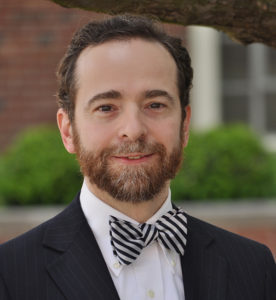An evangelical scholar is calling out a Southern Baptist Convention leader for condemning immorality when it comes to President Donald Trump but glossing over it in recent tributes to Martin Luther King Jr.
Robert A.J. Gagnon, former associate professor of New Testament at Pittsburgh Theological Seminary, said on Facebook April 8 that an April 3-4 conference commemorating the 50th anniversary of the civil rights leader’s assassination in Memphis, Tenn., all but ignored “the problem of King’s heretical views and extraordinary sexual immorality.”

Robert Gagnon
Gagnon, a conservative biblical scholar recognized as the foremost traditionalist interpreter on the topic of the Bible and homosexuality, said Russell Moore, head of the SBC Ethics and Religious Liberty Commission and lead organizer of the gathering, failed to address documented evidence that King lived a sexually immoral personal life.
Gagnon called Moore “the same guy, mind you, who has had no trouble accusing the vast majority of his brethren who voted for Trump in order to avoid Clinton (or who supported Roy Moore in order to avoid Doug Jones) of falling prey to ‘moral relativism’ and ‘consequentialism,’ of being an embarrassment to the gospel because they are not standing up for their own Bible values around sexual fidelity in marriage.”
“He said not a word about MLK’s sexual immorality that was arguably the equal of Trump’s,” the scholar said.
Gagnon said speakers at the “MLK50: Gospel Reflections From the Mountaintop” confab also tried to explain away “the fact that by any reasonable standard of what counts for essential Christian faith, King was what evangelicals then and today would view as a heretical Christian.”
“He denied Christ’s incarnation, virgin birth, substitutionary atonement, bodily resurrection, and second coming; in short, a full sweeping denial of orthodox Christian faith,” Gagnon said in an earlier post. “For King, Christ was an excellent moral teacher and human exemplar of trust in God. No more, no less.”
Gagnon said King’s sexual immorality was arguably worse than Trump’s, not only because he was a minister of the gospel but also because he “was willing to risk the fate of the entire civil rights struggle in order to continue his sexually immoral conduct, week after week, right up to what would be his final night on earth.”
Gagnon called it “extraordinary” that Moore had nothing to say about it. “Now we know for certain that the charge of ‘moral relativism’ only applies to those who support figures whom Russell Moore does not like for other reasons,” he concluded.
Gagnon said he applauds King’s “civil rights legacy, rhetorical brilliance, personal sacrifice, and non-violent method.”
“I can do so without fabricating for him a more favorable theology and record of sexual morality than the historical record warrants or he deserves,” he said. “Others apparently cannot do this but feel compelled to falsify or minimize the historical record, using a standard different from the one they use on Trump and Roy Moore and then exempting themselves from the charge of moral relativism with which they accost others.”
“Doing so does not make them greater champions of civil rights; nor it does not signal greater virtue or integrity on their part,” he said.
About 4,000 people attended the MLK50 conference, co-sponsored by the Gospel Coalition, a fellowship of churches in the Reformed tradition “deeply concerned about some movements within traditional evangelicalism that seem to be diminishing the church’s life and leading us away from our historic beliefs and practices.”
Reviews from those in attendance were overwhelmingly positive, but there were critics.
Fellowship Baptist Church in Sidney, Mont., announced it is leaving the Southern Baptist Convention, saying church leaders believe Moore and the ERLC are moving toward the Social Gospel, a 20th-century movement applying Christian ethics to social problems embraced by Mainline Protestants but generally viewed with suspicion by conservative evangelicals.
“What is being taught, boldly and proudly and distinctly, is that social justice is part and parcel with the gospel, if not the same thing,” Pastor Jordan Hall said in his April 8 sermon posted on the Pulpit and Pen blog.
“A social gospel is a false gospel,” Hall said. “The gospel is not about what we need to do. The gospel is about what Jesus has done. When you add to the gospel, all you can do is take away from it.”
Lorine Spratt, an African-American woman on staff at a Southern Baptist church in Louisiana, said Russell Moore does not speak for her when he urges churches to seek to become racially diverse.
“I, and many other black congregants, attend a predominately white, Southern Baptist evangelical church,” she said in an open letter published by The Baptist Message. “We attend there because we are free to do so, we’ve been welcomed, and we’re seen and treated as brothers and sisters in Christ.”
“I truly believe that I could attend any white evangelical church and be welcomed,” she said. “However, there are born again black believers who choose to attend black evangelical churches and worship within their culture and they are free to do so. We are exercising our freedom to choose. We are not commodities to be bargained with or exploited or used to promote an agenda or boost quotas.”
